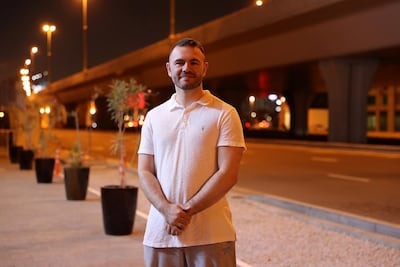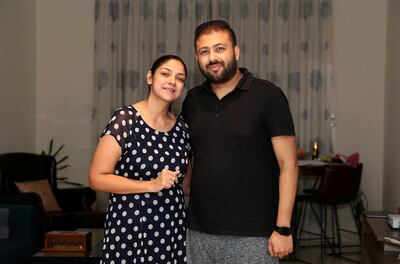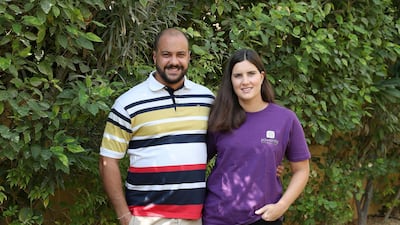Ryan Maxwell and his wife Becky, both British, have decided to go child-free. The financial obligations associated with raising children is one of the reasons why the couple decided not to become parents.
US financial comparison site NerdWallet estimates that to raise a child from birth to the age of 18 will cost at least $260,000 for food, housing, clothing, transportation, healthcare and health insurance.
Add in the extras and that figure soars to $745,634 (Dh2.7 million) once childcare, birthday parties and presents, bicycles, education, college savings, music and sports lessons, holidays, laptops and smartphones are accounted for, the 2017 study found.
Avoiding such expenditure will help Mr Maxwell, a 33-year-old digital experience manager with a UAE bank, and his wife, who works for a debt charity in the UK, attain financial freedom earlier compared with their peers who have children.

“Deciding to be child-free will allow my wife and me to attain financial freedom by the time I turn 55,” says Mr Maxwell, who moved to the UAE a year ago.
To achieve that, he is building an investment portfolio that currently comprises an 80:20 split of bonds and shares. He invests in two exchange-traded funds: a Vanguard All World ETF and a government bond. This has been done without the help of a financial adviser as the British expat handles his investments himself.
Mr Maxwell also plans to execute a property strategy in 2021 by purchasing a buy-to-let property in the north of England.
"I will use these investments as my primary income stream once I retire from active work life. The ETFs require very little effort to manage and I rebalance my portfolio every 12 months," Mr Maxwell tells The National. He has also considered commodities and cryptocurrencies, but is comfortable with his current investment strategy.
Mr Maxwell admits that his personal circumstances allow him to have a better risk appetite. “Being child-free is just one element of it, but it’s not the primary reason. I also live moderately and am sensible with money,” he adds.
Couples with no children tend to achieve financial freedom and retire from active work life quicker than their counterparts with kids, say financial advisers. This is because they do not need to save for their children’s education or worry about leaving a legacy.
“If they wanted to downsize their home and live in a studio apartment in order to free up more capital, they can. Couples with kids can’t do that and they can’t make that type of decision easily,” says Stuart Ritchie, director of wealth advice at AES International.
“Priorities are different and couples with kids want to provide room for their children to grow and develop.”
The “financial independence and retire early” movement has been gaining popularity, Mr Ritchie adds. “We’ve seen couples save more than 50 per cent of their incomes and downsize their homes in order to retire early and travel the world, or semi-retire and earn a smaller income doing something they’re passionate about like art, photography and so forth,” adds Mr Ritchie.
Stephanie Lopes da Costa and her husband, José Sobral, both 35-year-old Brazilian expats living in the UAE, intend to have children only after getting their finances in order. This includes buying a house, having stable jobs and a decent amount of savings.
“We understand there are lots of expenses associated with children,” says Ms Lopes da Costa, who is a general manager at a trading company, while her husband manages sales for their business, Zovento, an online listings platform of events suppliers.
The couple have invested in National Bonds in the UAE, the S&P 500, equities in the MSCI EAFE (developed markets) Index, peer-to-peer lending platform Beehive and also have cash savings.
The husband-and-wife duo, who intend to become parents in the near future, realise they will not be able to attain financial freedom in their 40s. “We will invest in our kids’ education the best we can and then let them work on their own futures. The plan is to attain financial freedom somewhere around our mid-50s for ourselves, to enjoy our lives,” adds Ms Lopes da Costa, who is usually the decision maker on the couple's investments.
Despite having more disposable income, the couple prefer low-risk, long-term investments, which take advantage of time and offer stable returns.
“The riskier investment we have is our business, which we launched in the middle of this year. We took a good part of our cash savings, but this was more to satisfy an entrepreneurial appetite than a risky investment,” she says.
The couple have taken out life insurance, terminal illness and incapacity insurance, and also plan to draft and register a will in the UAE soon.
While inheritance is not a consideration for couples without children, financial advisers say they can instead support charities, extended family members or even friends.
“Often, couples without children work to provide enough to live the lifestyle they desire and do not worry about what they leave behind financially. So, there is less pressure to earn, save and invest as much as a parent might feel,” Carol Glynn, founder of the Dubai-based Conscious Finance Coaching, says.
However, wills are important for couples without children. When one spouse dies, the other usually inherits the assets and wealth. But what happens when the second person dies? It would likely all go to their next of kin, possibly their sister or brother, Ms Glynn says.
“Couples should consider these situations and ensure their will covers all possibilities should one or both individuals die and both are happy with who the ultimate heirs would be,” she adds.
Couples without children usually require less life insurance because they have no dependents, and the premium is likely to be lower, Ms Glynn adds.

Dinesh Ochani and his wife Karishma Valecha, who are child-free for now, have been investing consistently over the past six years.
Mr Ochani, 35, invests in equities and bonds through a systematic investment plan.
“I also invest in blue-chip stocks of companies such as Amazon, Apple and Google because they offer good returns over a longer period of time. In 20 to 30 years, these funds could be used for retirement,” says Mr Ochani, who is a financial controller with a consumer goods company, while his wife is self-employed.
The couple save their money in fixed deposits in India and invest in gold. They have also set aside four to five months’ worth of expenses in an emergency fund and they are actively discussing taking out a UAE will next year.
Mr Ochani admits to investing in riskier stocks such as the pharma sector during Covid-19 because he has a higher disposable income.
“I am comfortable taking these risks, although the market has been volatile. However, trading in gold and oil is quite risky,” he adds.
Couples should not feel they can be more risky or adventurous with their investment portfolio because they don't have children, Ms Glynn says. Instead, she suggests a mix of ETFs, bonds, property and a small percentage of more risky investments that they may have a personal interest in, such as shares and cryptocurrencies.
While childless couples do not typically spend on big cars, big houses or pay expensive school fees, they often tend to buy more luxury items or opt for expensive holidays, she adds.
Couples without children will, on average, have the highest annual per household spend globally through to 2030, according to Euromonitor International. No children and more time means they are able to lead expenditure-intensive lifestyles. This includes more holidays, nights out and higher spending on clothes, cars and culture, Euromonitor says in the Future of the Family: Trends in Consumer Spending whitepaper.
“There’s a tendency to overspend and live in ‘the now’ since they only need to consider their own needs and goals. However, this way of life can often mean taking out loans and credit cards to fund their spending habits,” Mr Ritchie says.
Such couples are typically more liberal in their spending habits because they don’t have the liabilities and future costs such as university fees to consider and it is common to find them overspending, under-saving and under-investing, according to Ms Glynn.
“Having kids means you have someone who is financially dependent on you, often for up to 21 years, and we need to ensure we are in a financial position to provide for them. When couples don’t have children, they often don’t have the same sense of urgency to invest to protect their financial future,” Ms Glynn says.
Another common mistake committed by child-free couples is to have large amounts of cash in a savings account that offers low interest, Ms Glynn says.
“If they have clear goals in place, they would be more likely to invest that extra cash and put it towards an earlier retirement, for example, rather than another luxury staycation or designer piece of clothing they don’t really need and is not adding value to their lives,” Ms Glynn says.
There are some couples without children who are not retiring earlier because they have lost sight of their financial goals.
“They are often more carefree with their money and don’t take advantage of their ability to invest more and sooner. They may not achieve financial freedom any earlier than a couple with children whose minds and finances are focused on retirement planning,” Ms Glynn says.


